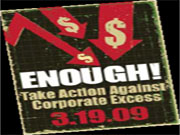News
No one’s work performance is worth $51,000 per hour

UNI global union is pleased to report that US regulators are taking steps to regulate the gross excesses of private equity principal’s pay packages. President Obama’s administration is discussing ways to link executive compensation practices more closely with performance. The new rules are aimed at obtaining more information on compensation and curbing systemic risk. For this reason the rules could apply to private equity and hedge funds as well as the banks.
The top 10 CEO’s of the top 5 private equity firms have a net worth of over US$ 34 billion. In 2007 financial newspapers reported Blackstone private equity baron Stephen Schwarzman earning well over a million dollars a day. In the same year CEO Henry Kravis of KKR private equity was reported to earn US$51,000 an hour.
UNI global union General Secretary Philip Jennings says “These figures are way off the pay scale and it is long overdue that regulators bring the excess down. How can we really say we are making an effort to rebuild a fairer financial system for the benefit of all workers if this is allowed to continue?”
Private equity admit that the fees they have been charging for service are probably not justified.
"Everyone knows the fees are too high," Billy Gilmore, the head of Scottish Widows' private equity arm. "Funds have doubled, tripled in size but the cost of doing business hasn't increased with such a magnitude. People can make a lot of money out of management fees by not doing any deals at all," he said.
Many private equity leveraged buy-outs use financial engineering as a way of making profits. Success is not based on a process of company development or skilled management performance. Private equity firms reward themselves millions of dollars for using complex mathematical equations to make a profit. This method of profiteering does not return any long term benefit to the companies they have bought. Many private equity portfolio companies are now struggling to survive the financial crisis because of the amount of debt loaded onto them. The risk of failure is high and lies completely on the portfolio company and its workers, and not on the private equity firm or its operators.
UNI welcomes the US government’s consideration to overhaul the gross compensation practices of private equity barons. US treasury officials are expected to release the new executive compensation rules by end of May.

